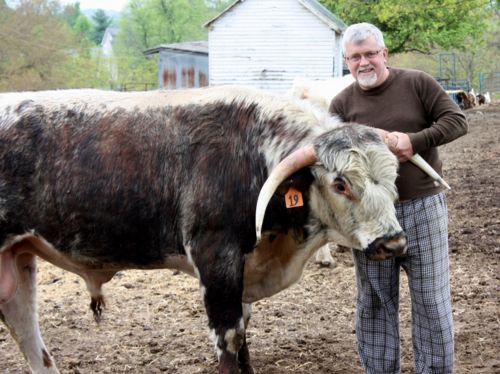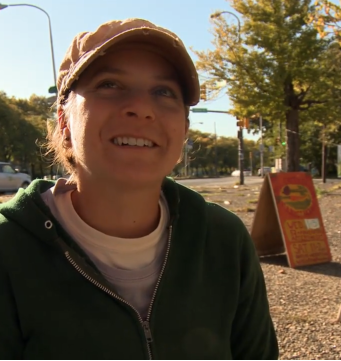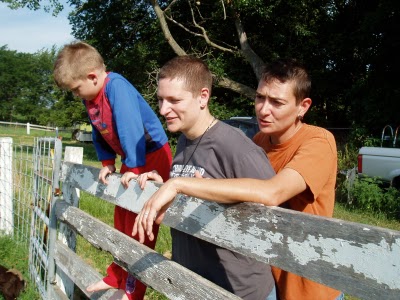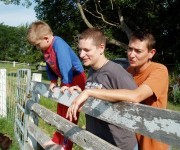 Frank Baylis.Early on in Frank Baylis’ farming career, you’d be about as likely to run into an out gay farmer in Virginia as you would a cross-dressing postal worker in Mayberry. Baylis, of Bayshore Kennel and Farm in Tom’s Brook, Va., shared one experience, the beginning of which sounds like a very bad joke: “So I walk into the local feed store, and all the usual guys are hanging out by the pot-bellied stove, but there’s a new guy there. I say a few words as I’m getting my stuff, and then walk out. Forgetting something, I come back in and overhear the new guy ask, ‘He queer?’ One of the other guys says, ‘Yeah, but we like that queer.'” That was 30 years ago. Baylis realized it could have been different. “I’ve been very lucky,” he adds. “I’m good at what I do and the locals don’t really care if I’m gay.”
Frank Baylis.Early on in Frank Baylis’ farming career, you’d be about as likely to run into an out gay farmer in Virginia as you would a cross-dressing postal worker in Mayberry. Baylis, of Bayshore Kennel and Farm in Tom’s Brook, Va., shared one experience, the beginning of which sounds like a very bad joke: “So I walk into the local feed store, and all the usual guys are hanging out by the pot-bellied stove, but there’s a new guy there. I say a few words as I’m getting my stuff, and then walk out. Forgetting something, I come back in and overhear the new guy ask, ‘He queer?’ One of the other guys says, ‘Yeah, but we like that queer.'” That was 30 years ago. Baylis realized it could have been different. “I’ve been very lucky,” he adds. “I’m good at what I do and the locals don’t really care if I’m gay.”
 Johanna Rosen from Mill Creek Farm.Farmers like Frank have paved the way for today’s new lesbian, gay, bisexual, and transgender (LGBT) farmers, who, with their own reality TV show, blogs, a film project, a Google group (called Rainbow Chard, no less), and a dating site, are enjoying increased visibility. But it’s about more than visibility.
Johanna Rosen from Mill Creek Farm.Farmers like Frank have paved the way for today’s new lesbian, gay, bisexual, and transgender (LGBT) farmers, who, with their own reality TV show, blogs, a film project, a Google group (called Rainbow Chard, no less), and a dating site, are enjoying increased visibility. But it’s about more than visibility.
The current back-to-the-land movement is drawing a lot of different people for a number of reasons: a desire to live more sustainably, engage in the hands-on work of food production, and participate in a process that requires creative problem solving. These characteristics make it attractive to those who share an iconoclastic bent and a set of values around both community and independence — values common in the queer community.
The LGBT community has a history of organizing collectively and revitalizing urban spaces. Is it possible that queer farmers are invigorating farming with a new vision that is less restrictive, and more creative? From the looks of it, many queer small-scale farmers seem to think so, even as they face the same day-to-day struggles that other farmers do to make food production viable.
 Courtney Skeeba and Denise Whitesides of Homestead Ranch. Photo: Jonah MossbergMaking it work
Courtney Skeeba and Denise Whitesides of Homestead Ranch. Photo: Jonah MossbergMaking it work
As very small-scale producers, Baylis and his partner Chris Oldt, who has farmed with him for the past 22 years, have stayed in business by raising extremely rare heritage livestock breeds such as English Longhair Cattle, and African Hairsheep. They also raise and show purebred dogs on the side for extra income and sell only occasional livestock animals for breeding purposes (so as not to create competition). The business requires a careful balance between sales of breeding stock and sales of meat animals to local, specialty buyers.
“I don’t want to raise commercial, mass-produced animals,” says Baylis. He recognizes that his reliance on heritage breeds can seem gimmicky at times, but he’s driven enough to make it work. Laughing, he says, “I live my life like Gypsy Rose Lee in the movie Gypsy … ‘you gotta have a gimmick to get ahead.'”
He’s also committed to raising his animals on pasture, a choice that makes ecological sense because he lives in an area rich in native grasses. “One of my neighbors turned his pasture to corn. Now all I see is corn when I look out there,” he says. “Maybe that’s where the money is, but I’m a livestock farmer, not a crop farmer.”
Johanna Rosen presents another interesting example of a queer farmer pursuing an alternative model. She and her farm partner Jade Walker run Mill Creek Farm, a community-based, nonprofit, educational farm in Philadelphia, where they grow and sell produce while running three farm stands and several youth programs. Though their farm is a nonprofit, they must remain relevant to the community where access to healthy food isn’t always easy. Johanna says it’s a challenge not to stretch too thin, or expand to the point that they become part of the “nonprofit industrial complex.”
“Our main goal is to stay competitive with the other food options for residents in the neighborhood, which are mostly trucks selling bags of cheap produce from the wholesale mart,” says Rosen. “Ours are fresher and we don’t use chemicals. We’re also able to respond to feedback directly … for example, when we realized that we were selling out of okra really quickly, we started planting more. Now we plant three times more okra than we used to.”
Is Rosen’s commitment to the community indicative of a queer approach to farming? Yes and no, she says, “I don’t make my work about me or being gay,” she says. “But I feel like urban farmers are queering the food system. Just by bringing fresh food to this neighborhood we’re mixing it up.”
Queering farming
Jonah Mossberg, farmer, filmmaker, and creator of The Queer Farmer Film Project, says he thinks there’s a natural connection between the instincts involved in rethinking food production and those involved in rethinking human relationships.
“For a queer person, farming is like looking in a mirror. There’s room for experimentation and for things to shift and change,” he says. The film, now in post-production, will profile farms all over the country — urban, rural, for-profit, and nonprofit — run by individuals, groups of friends, and queer families.
The farmers featured in the film are pouring fresh energy into their field, whether through providing food to inner city neighborhoods, specializing in something nobody else offers, or just creating a community of like-minded people.
“A lot of people want to get back to the roots of growing and producing wholesome food and knowing where it comes from,” says Courtney Skeeba. She and her partner Denise Whitesides of Homestead Ranch in Lecompton, Kan., raise goats and produce products such as hand cream and soap with goat’s milk. She believes this active curiosity comes naturally to LGBT folks. “As a group of individuals, queer people have a tendency to be a bit more aware and active,” she says.
Farming also appeals to a desire to work autonomously, free of the rigid expectations of most workplaces.
“There’s a lifestyle appeal to urban farming in particular,” adds Rosen. “You get to live in a city and keep your queer community but still be a farmer.” And, she adds: “You don’t need to conform, or wear anything in particular.”
The visibility of out queer farmers like Rosen, Skeeba, and Baylis, and the work of Mossberg, all help to promote acceptance, safety, and mainstreaming for other LGBT farmers. Beyond acceptance, however, it’s possible that their work will lead to changes in farming itself — making it less restrictive, and more fertile with possibility. While working on The Queer Farmer Film Project, Mossberg spent
time shooting footage at Montview Neighborhood Farm in Northampton, Mass. He describes it as “a hand-cultivated, permaculture, queer operation” that sums up the stamp many LGBT folks are already putting on the food system. “Contrasted with that, right next door,” he adds, “there’s a farm with all these straight rows, run by straight people. Farming can definitely be an expression of people’s minds and orientations.”


